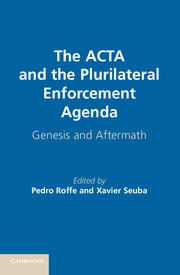Book contents
- Frontmatter
- Contents
- List of Contributors
- Foreword
- Acknowledgments
- Acronyms
- Introduction
- PART I THE FINAL ACT: ITS MAIN FEATURES AND CONTENTS
- PART II DOMESTIC LEGISLATIVE CHALLENGES
- PART III IMPACT ON RELATED PROCESSES
- 13 Three Steps Taken toward a Reinterpreted Three-Step Test
- 14 ACTA and the Future of Access to Knowledge in the Digital Environment
- 15 ACTA, East African Enforcement Legislation and Generic Medicines
- 16 The EU and Its IP Policies
- PART IV VIEWS FROM STAKEHOLDERS: LESSONS
- PART V WHAT LIES AHEAD ACTA
- Annex I Anti-Counterfeiting Trade Agreement
- References
- Index
- References
16 - The EU and Its IP Policies
ACTA and Third Countries
Published online by Cambridge University Press: 05 December 2014
- Frontmatter
- Contents
- List of Contributors
- Foreword
- Acknowledgments
- Acronyms
- Introduction
- PART I THE FINAL ACT: ITS MAIN FEATURES AND CONTENTS
- PART II DOMESTIC LEGISLATIVE CHALLENGES
- PART III IMPACT ON RELATED PROCESSES
- 13 Three Steps Taken toward a Reinterpreted Three-Step Test
- 14 ACTA and the Future of Access to Knowledge in the Digital Environment
- 15 ACTA, East African Enforcement Legislation and Generic Medicines
- 16 The EU and Its IP Policies
- PART IV VIEWS FROM STAKEHOLDERS: LESSONS
- PART V WHAT LIES AHEAD ACTA
- Annex I Anti-Counterfeiting Trade Agreement
- References
- Index
- References
Summary
Introduction
Europe’s trade relations with Asia are increasingly advanced through so-called Broad-based Trade and Investment Agreements (BTIAs). After the conclusion of its free trade agreement (FTA) with South Korea, the EU is actively negotiating with India, and talks with Singapore are well under way. Further talks with Japan and a number of other Asian partners are expected.
In terms of innovation policy and technology transfer, intellectual property rights and their protection feature strongly in the BTIA template that the EU has been fine-tuning since it concluded FTAs with the Caribbean Community (CARICOM), as well as Colombia and Peru and, more recently, South Korea. The EU was also to become a party to the Anti-Counterfeiting Trade Agreement (ACTA), but since the European Parliament’s rejection of the treaty on 4 July 2012, it is clear that less ambitious bilateral arrangements are the way forward.
The ongoing negotiations on the EU-India FTA show that, despite ACTA being off the table, intellectual property remains a contentious issue. In addition, new bilateral deals are currently being brokered or have been announced. EU-Singapore and EU-Malaysia talks have been under way since 2010, EU-Vietnam talks since June 2012 and EU-Japan FTA trade negotiations were announced on 29 November 2012. Many other Asian nations are currently involved in negotiations on the Transpacific Partnership Agreement (TPP) with the United States, which demands US-style protection of intellectual property rights from its trading partners.
- Type
- Chapter
- Information
- The ACTA and the Plurilateral Enforcement AgendaGenesis and Aftermath, pp. 259 - 270Publisher: Cambridge University PressPrint publication year: 2014
References
- 2
- Cited by

